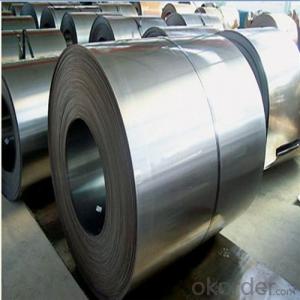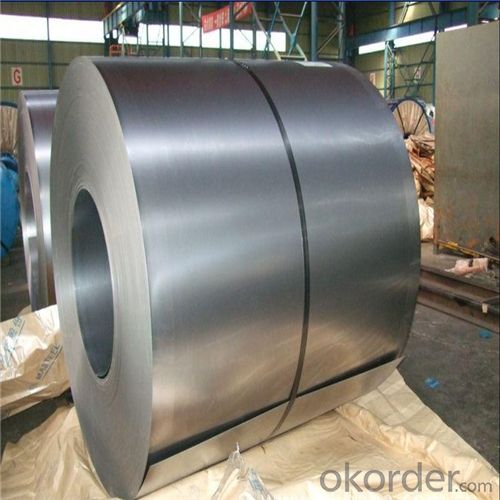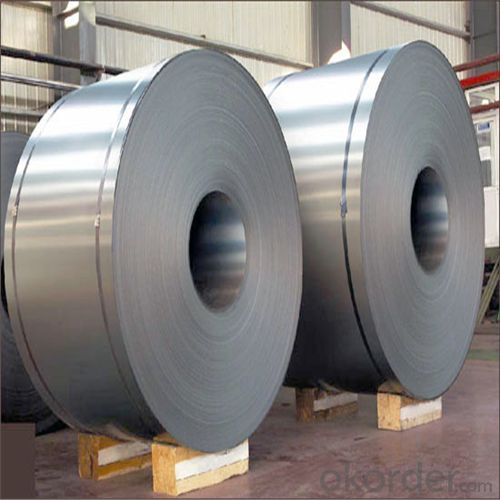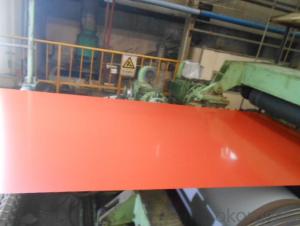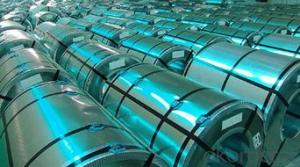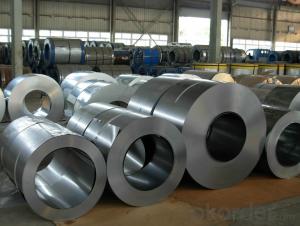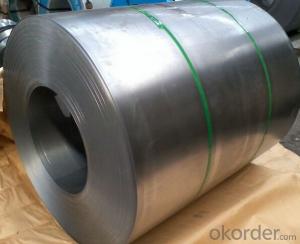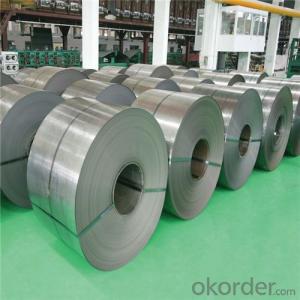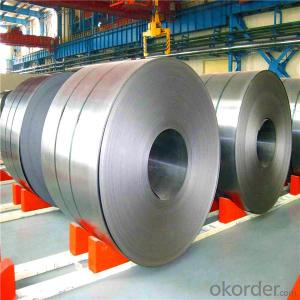Pure Cold Rolled Steel Coil Used for Industry with Too Low Price
- Loading Port:
- Shanghai
- Payment Terms:
- TT OR LC
- Min Order Qty:
- 25 m.t.
- Supply Capability:
- 5000 m.t./month
OKorder Service Pledge
OKorder Financial Service
You Might Also Like
Pure Cold Rolled Steel Coil Used for Industry
1.Structure of Cold Rolled Steel Coil Description
Cold rolling means that hot rolled steel coil is rolled below recrystallization temperature after pickling, and its finished product is full hard coil. After annealing process for full hard coil, the finished product is cold rolled production. The thin gauge cold rolled steel sheet and strip steel have advantages of low surface roughness, high dimension accuracy and good mechanical properties etc, and which have been widely used in auto manufacturing, home appliance, architecture, aviation, precision instrument, hardware and enameling industry etc.
2.Main Features of the Cold Rolled Steel Coil
•High Purity
•Easy control and operation
•High strength
•Fast melting
•Competitive price
•Best Service
3. Cold Rolled Steel Coil Images
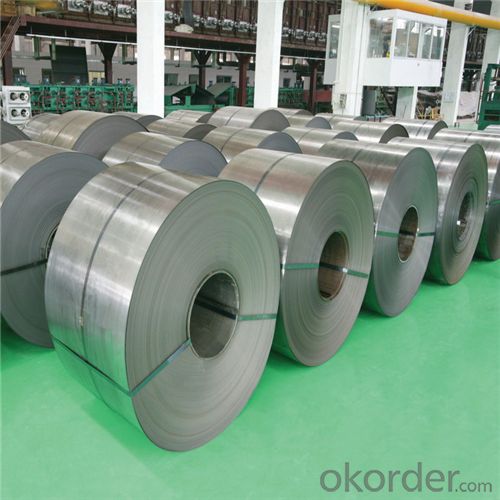
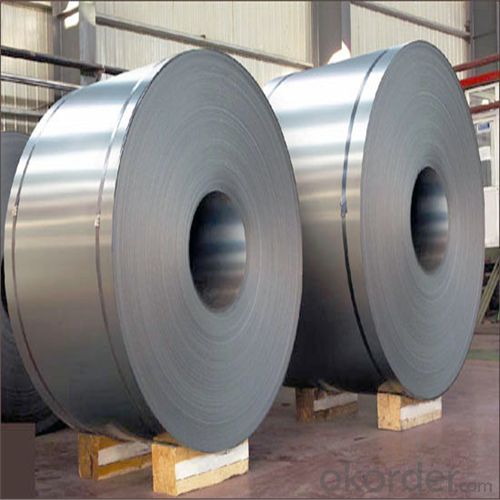
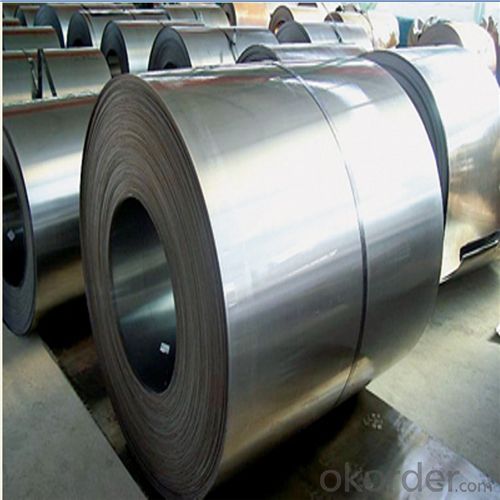
4. Cold Rolled Steel Coil Specification
COLD ROLLED STEEL COIL | |
Thicknenss | 0.10mm-4.00mm |
Width | 600mm-2000mm |
Sheets length | 1200-6000mm |
Coil inner diameter | 508-610mm |
Surface treatement | matt finish/bright finish,oiling/dry, bright anneal/black anneal |
Coil weight | 3-5t |
5.FAQ of Cold Rolled Steel Coil
We have organized several common questions for our clients,may help you sincerely:
①How about your company?
A world class manufacturer & supplier of castings forging in carbon steel and alloy steel,is one of the large-scale professional investment casting production bases in China,consisting of both casting foundry forging and machining factory. Annually more than 8000 tons Precision casting and forging parts are exported to markets in Europe,America and Japan. OEM casting and forging service available according to customer’s requirements.
②How to guarantee the quality of the products?
We have established the international advanced quality management system,every link from raw material to final product we have strict quality test;We resolutely put an end to unqualified products flowing into the market. At the same time, we will provide necessary follow-up service assurance.
③How long can we receive the product after purchase?
In the purchase of product within three working days, We will arrange the factory delivery as soon as possible. The pecific time of receiving is related to the state and position of customers.Commonly 7 to 10 working days can be served.
- Q: What are the different coil packaging materials used for steel coils?
- Different materials are used for packaging steel coils, each with its own unique properties and benefits. Some of the most commonly used materials are as follows: 1. Stretch film is a flexible material that tightly wraps around the coil, providing protection against dust, moisture, and scratches. 2. Steel strapping is a strong and durable option that ensures the coils remain tightly bound during transportation or storage, thanks to its high tensile strength and resistance to breakage. 3. Plastic strapping, on the other hand, is a lightweight and cost-effective alternative to steel strapping. It offers good shock absorption and is resistant to rust and corrosion, making it suitable for smaller or lighter steel coils. 4. Paperboard is an environmentally friendly packaging material that provides a protective layer against dust and minor impacts. It also allows for slight breathability to prevent moisture buildup. 5. Wooden crates are commonly used for large or heavy steel coils, as they offer sturdy support and protection during handling, transportation, or storage. 6. Corrugated cardboard is a versatile and lightweight material suitable for smaller steel coils. It provides cushioning and protection against minor impacts, and it is easily recyclable. The choice of packaging material for steel coils depends on factors such as coil size and weight, transportation requirements, and the desired level of protection. Each material has its own advantages and should be selected based on the specific needs of the steel coil packaging.
- Q: What are the different types of coil leveling machines?
- There are several different types of coil leveling machines used in various industries. Some of the most common types include: 1. Precision Roll Levelers: These machines are highly accurate and capable of leveling coils with high precision. They use a series of rolls to apply pressure and remove any distortions or imperfections in the coil. 2. Straighteners: Straighteners are used to flatten coils that have become curved or warped during the manufacturing process. They typically consist of a set of rollers that gradually bend the coil in the opposite direction to restore its flatness. 3. Rotary Levelers: Rotary levelers are used to level coils that are thicker or have a higher yield strength. They utilize a series of rolls that rotate in opposite directions to apply pressure and flatten the coil. 4. Tension Levelers: Tension levelers are commonly used for leveling thin-gauge coils. They work by applying tension to the coil while passing it through a series of rollers. This process helps to remove any waviness or unevenness in the coil. 5. Stretch Levelers: Stretch levelers are specifically designed to level coils made of high-strength materials. They use a combination of stretching and bending to remove any irregularities in the coil's surface. 6. Cut-to-Length Lines: These machines not only level the coil but also cut it into specific lengths as per the customer's requirements. They are commonly used in industries where precision and customization are essential, such as automotive or construction. Overall, the choice of coil leveling machine depends on factors such as the type and thickness of the coil, desired level of accuracy, and the intended application of the leveled coil.
- Q: How are steel coils welded together?
- Steel coils can be welded together using various methods, depending on the specific requirements and the type of steel being used. One common method is the use of electric resistance welding (ERW), where an electric current is passed through the steel coils to generate heat. This heat melts the edges of the coils, and pressure is applied to join them together. ERW is a quick and cost-effective method for welding steel coils. Another method is high-frequency induction welding (HFIW), which is commonly used for thinner steel coils. In this process, an induction coil is used to generate an alternating magnetic field, which induces an electric current in the steel coils. The resistance of the coils to this electric current generates heat, causing the edges to melt and form a weld. For thicker and heavier steel coils, submerged arc welding (SAW) is often employed. This method involves the use of a granular flux and a continuous electrode, which is fed into the weld area. The flux melts, creating a protective shield for the weld pool, and the electrode melts to form the weld. SAW is a robust and efficient method for welding steel coils. Additionally, laser welding and gas metal arc welding (GMAW) can also be used to weld steel coils. Laser welding offers high precision and speed, while GMAW, also known as MIG welding, uses an electric arc between a consumable wire electrode and the steel coils to create a weld. Regardless of the welding method used, the key factors for successful welding of steel coils are proper preparation of the edges, maintaining the appropriate heat and pressure levels, and ensuring the correct welding technique is employed.
- Q: Steel is no doubt a better constructin material but it is only in practice in developed country.i would like that we should high lights the benifits and negatives of steel to make the steel more clear as a construction material.Hope some expert to address this topicMD
- Steel Structure considered as the most efficient and fast in completion of any project, specially the high rise buildings, also the logistics during construction is less complicated than the normal methods, Steel Structure has so many advantages vs the disadvantages, and highly recommended for commercial buildings
- Q: Can steel coils be recycled?
- Yes, steel coils can be recycled. Steel is a highly recyclable material, and recycling steel coils helps to conserve natural resources and reduce environmental impact.
- Q: What are the common coil widths and thickness combinations available for steel coils?
- The common coil widths and thickness combinations available for steel coils vary depending on the specific requirements and industry standards. However, there are some standard sizes that are commonly available in the market. For coil widths, the most common standard sizes range from 600mm to 2000mm. These widths are widely used in various industries such as automotive, construction, and manufacturing. However, custom widths are also available to meet specific project needs. As for the thickness combinations, steel coils are typically available in a range of thicknesses. The most common thicknesses for steel coils are between 0.4mm and 3mm. However, thicker or thinner options are available depending on the specific application. It is important to note that these standard sizes and thickness combinations may vary based on the specific steel grade, manufacturing process, and the supplier's capabilities. It is always recommended to discuss the required specifications with the supplier or manufacturer to ensure the availability of the desired coil widths and thickness combinations.
- Q: How are steel coils used in the production of aerospace structures?
- Steel coils are used in the production of aerospace structures in various ways. One of the main applications is in the manufacturing of aircraft frames and components. Steel coils are often used as the raw material to fabricate the structural members of an aircraft, such as fuselage sections, wing spars, and landing gear. The coils are typically processed through a series of operations, including cutting, bending, and welding, to shape them into the required structural components. Steel coils are preferred in aerospace applications due to their high strength and durability. They can withstand the extreme forces and stresses experienced during flight and landing. The use of steel coils ensures that the aerospace structures have the necessary structural integrity to endure the harsh operating conditions. Additionally, steel coils are also used in the production of aerospace fasteners and connectors. These fasteners play a crucial role in holding various components and structures together. Steel coil materials are often used to manufacture bolts, screws, and rivets, which are essential for assembling different parts of an aircraft. The strength and reliability of steel coils make them suitable for fastening applications, ensuring that the aerospace structures remain securely connected. Furthermore, steel coils are utilized in the production of aerospace equipment and machinery. Many aerospace manufacturing processes rely on heavy machinery and specialized equipment. Steel coils are commonly used in the construction of these machines due to their ability to provide robust and sturdy frameworks. They are often employed in the fabrication of tooling, jigs, fixtures, and molds, which are essential for producing aerospace structures with precision and accuracy. In summary, steel coils play a vital role in the production of aerospace structures. They are used as raw materials for manufacturing aircraft frames and components, fasteners and connectors, as well as aerospace equipment and machinery. The strength, durability, and reliability of steel coils make them indispensable in the aerospace industry, ensuring the safety and integrity of aerospace structures.
- Q: What are the common coil diameter and weight combinations available for steel coils?
- The common coil diameter and weight combinations available for steel coils vary depending on the specific requirements of the industry or application. However, some commonly available coil diameter ranges include 24 inches to 72 inches, while weight combinations can range from 3,000 pounds to 50,000 pounds or more. These dimensions can be further customized based on the needs of the customer and the capabilities of the steel manufacturer.
- Q: In the warehouse management system of steel coil
- The warehouse is set to be required under the factories and production equipment and manpower planning, reasonable layout; to strengthen the internal economic responsibility system, scientific division, forming material export management assurance system; the service must implement the work quality standard > standardization, application of modern management technology and the ABC classification method, and constantly improve the level of warehouse management.
- Q: How are steel coils used in the production of wire products?
- Steel coils are an essential component in the production of wire products. These coils are typically made from high-quality steel and are used as a raw material for wire drawing processes. Wire drawing is a manufacturing technique used to reduce the diameter of the steel coil and transform it into various wire products. To begin the process, a steel coil is placed on a wire drawing machine. The machine then pulls the coil through a series of dies, which are progressively smaller in size. As the coil passes through each die, the diameter of the wire is reduced, resulting in a thinner and longer strand of wire. This process can be repeated several times until the desired wire thickness is achieved. Once the wire is drawn, it can be further processed to create various wire products such as fencing, nails, screws, springs, and electrical wires. The wire can be cut to specific lengths, bent, or shaped according to the intended use. Additionally, it can undergo treatments such as galvanizing or coating to enhance its durability and resistance to corrosion. Steel coils provide several advantages in the production of wire products. Firstly, they offer a consistent and uniform material, ensuring that the resulting wire products have consistent quality and performance. Secondly, steel coils are easily transportable and can be stored efficiently, making them a cost-effective option for manufacturers. Lastly, the versatility of steel allows for the production of wire products with different tensile strengths and properties to meet specific industry requirements. In conclusion, steel coils play a crucial role in the production of wire products. They are the primary raw material used in wire drawing processes, where they are transformed into various wire products through a series of reduction steps. The resulting wire products find applications in a wide range of industries, making steel coils an indispensable component in the manufacturing sector.
Send your message to us
Pure Cold Rolled Steel Coil Used for Industry with Too Low Price
- Loading Port:
- Shanghai
- Payment Terms:
- TT OR LC
- Min Order Qty:
- 25 m.t.
- Supply Capability:
- 5000 m.t./month
OKorder Service Pledge
OKorder Financial Service
Similar products
Hot products
Hot Searches
Related keywords
